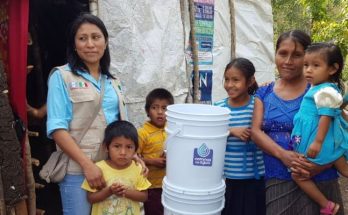By Kathleen Bohné Lowenstein
“Magical…welcoming…colorful…cosmopolitan…”
These are some of the words used to describe San Miguel de Allende by seven expatriate women who have lived here for decades. We gathered one afternoon, hosted by San Miguel Life’s Nancy Howze, in her garden bursting with blooms of white roses and birds of paradise under a brilliant blue sky to share comida and experiences of life in this small colonial Mexican city.
Ask any “expat” living in San Miguel—one who just moved down two weeks ago or one who arrived before there was even a supermarket—and you will hear many different stories, but all woven with similar threads of community, culture and beauty. The cultural richness and enchanting spectacles of this town bring visitors from all over the globe, but there is something deeper that entices some to stay and build their lives here.
The pioneer in this group is Nancy, who has lived in San Miguel since 1998. Now enjoying her active life here at 75, she has witnessed the growth of this city and participated in the community through her work in real estate. She recalls the impression made on her when she first visited San Miguel and saw the vibrancy of what was then a predominantly retiree community of Americans and Canadians. “I never saw people in their 70s and older out and about Birmingham,” she remembers. “They were just parked in front of TV watching Vanna White…But here, I saw seniors skipping around town, meeting each other for coffee and they all looked so happy.”
Nancy chose to move to San Miguel without knowing anyone here or speaking Spanish, the first of several bold decisions she says she would have been less confident making in the U.S., such as starting a business from scratch. “I felt more inhibited in the States, more constrained.”
Kaley Parsons, another entrepreneur in the group, seconded this by explaining how much more accessible it was for her to open her own Pilates studio here compared to her previous home city, San Francisco. As a mother of four young children, Kaley also emphasized how she has been able to balance her work life here with motherhood through affordable childcare, a more forgiving pace of life and also, a strong community of families. “People say ‘yes’ here. If I have something come up, I can call a friend and ask her to pick up my son from school and I will hear ‘yes’ almost every time.”
This must be one of the magic ingredients in the San Miguel elixir: saying yes. All of these women felt like they could say yes to experiences, opportunities and adventures here that they may have hesitated to embrace elsewhere. And in return, this city and this community says “yes” to them by welcoming newcomers with open arms.
“People are so generous here, they will invite you into their homes, include you in gatherings even if you are new to town,” explains Ann Dolan, another San Miguel Life co-founder. She and her husband are also real estate entrepreneurs and parents whose three children were born and raised here. “It’s easy to find a group of people who resonate with your interests. We feel blessed our children have grown up in this environment, all three of them completely bilingual and bicultural. As a family we have met so many interesting, successful and fun people from all over the world here.”
“You can get to be so close so fast with people in San Miguel,” says Katharine Hibberts, Nancy’s daughter, in talking about the close-knit community. She thought her mother had lost her mind when she decided to move to Mexico, but after her first visit was hooked: “oh…now I get this.” A few years later, she left her job at Liz Claiborne in New York City and made the move to San Miguel. She bought a business and has grown it and her life here, marrying a Mexican man in 2018. “It’s also not a saturated market, so there are opportunities in business that would be more competitive to break into back home.”
Louise Gilliam, president of the non-profit Casita Linda, shared how much she felt supported as a single retired woman living here. “I just felt so comfortable here,” she explains. “The economics of San Miguel made sense for me too. My friend found a beautiful place for me to rent here while I was recovering from an operation in Dallas, she just said don’t worry I’ll take care of it. And she did! It’s amazing.”
Louise calls her work with Casita Linda “a blessing”. She became involved in the organization–which builds homes for some of San Miguel’s poorest residents–soon after moving to town 16 years ago. “We raised USD$700 at our first fundraiser and it was a big deal! At our last gala we raised USD$125,000 which will enable us to build homes for nine families in 2022. The expat community really helps the poorest of the poor here.”
“We feel Mexico has been so generous to us, we want to give back…this community is so loving,” explains Teri Kavanagh, an active force in local philanthropy who also serves as Rotary and Citizen Liaison Volunteer to the US Embassy in Mexico City. ”I always felt like I couldn’t be ‘enough’ in LA…I never felt at home.” Teri left Los Angeles and found San Miguel in a Departures magazine. Her parents are Mexican, but she had lived most of her life up to that point in the US. “I immediately felt at home. You get to do so much here and there is so much generosity. I started working with the Don Bosco orphanage, and then Feed the Hungry, and then I became involved in politics! I got to do things I never would have done. I wouldn’t have even considered going into politics in the US, and I didn’t want to be in it here, but realized it opened up so many possibilities and I met so many people.”
As business owners, philanthropists and mothers, all of these women have hopeful visions for the future of San Miguel. The cost of living here has risen steadily over the last decades—and as Teri points out, this is creating a scarcity of housing availability for lower-income workers—but it is still lower than any place comparable in the US. “When I first started coming down to visit my mom, I would bring my dry cleaning and schedule a haircut,” jokes Katharine, who was living in New York City when her mother settled in San Miguel. The caliber of restaurants, boutique hotels and luxury shops in San Miguel make it a sparkling jewel in Mexico’s tourism crown and elevate its status on an international level, and with that have come the growing pains of any city experiencing gentrification. The cost of living is not only lower than a similarly desirable urban area in the US because of less expensive food and service costs but also because the “carrying” costs of running your own business or owning a property here are more accessible. This extends to private education and after-school classes for children, which have also blossomed in recent years.
“I am excited about the increasing diversity here,” says Amber Nieto (co-founder of San Miguel Life and the founder of San Miguel Kids) who grew up in San Miguel and is now raising her family here. She has noticed a large influx of international families settling here and enrolling their children in the local schools. “I think more families are moving here because they value raising children in a bilingual, multicultural environment but also in a culture that puts family first and in a place with a rich cultural, historical heritage.”
Ann and her husband are pleased with the education their children received here, though they are now in boarding school in the US. “I think children who grow up here are more mature, they have been around adults more and are comfortable with people of different ages. The experience of growing up here is really paradise for young children—all of the festivals, even just walking through the Jardin. Every day is an adventure.”
As the light turns golden and the conversation and laughter continue, we reminisce about the changes we have all seen in our small but ever more sophisticated city. Yes, the traffic has increased and the developments are sprouting up everywhere you turn. The shifting sands of local politics are always a topic for shrugged shoulders and raised eyebrows, but as Nancy wisely put it: “I think a city is like a living organism: if it isn’t growing and thriving then it is withering and dying. This town is 500 years old…it isn’t going anywhere, it’s just getting better.”




